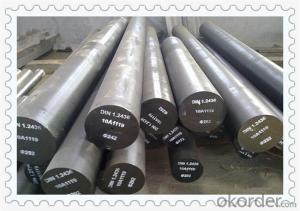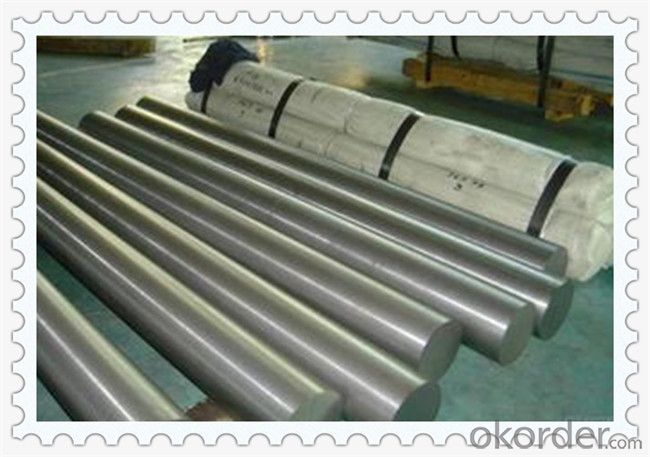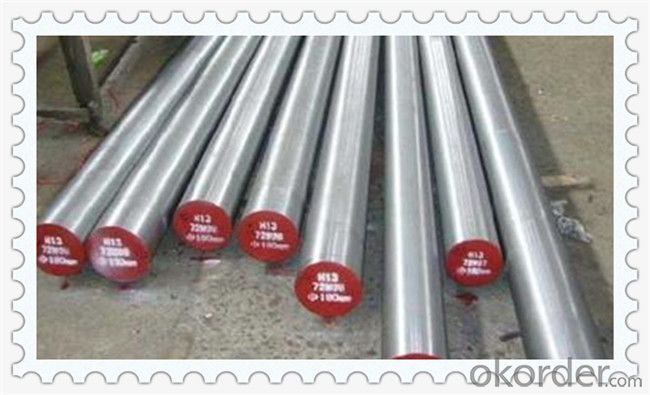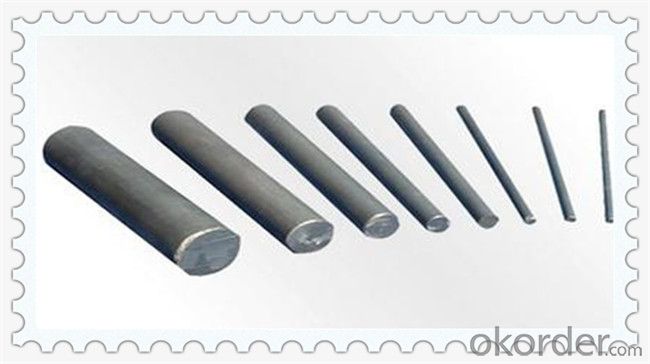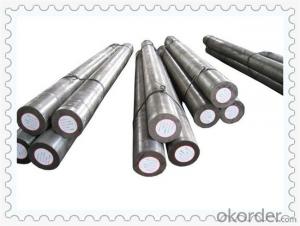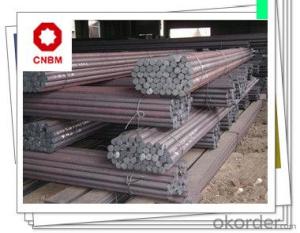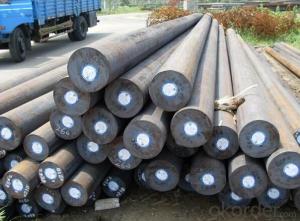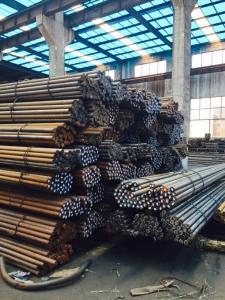C40 Carbon Steel Round Bars
- Loading Port:
- China main port
- Payment Terms:
- TT OR LC
- Min Order Qty:
- 30 m.t.
- Supply Capability:
- 10000 m.t./month
OKorder Service Pledge
OKorder Financial Service
You Might Also Like
C40 Carbon Steel Round Bars
Product Details
1. Steel manufacturing process: EAF+LF+(VD)+CCM+Hot rolled+(cold drawn)/(forged)
2.Ultrasonic test standard: SPE1921-GR3, CLASS C/C
3.Chemical composition
C | Si | Mn | S max | P max | B |
0.37-0.44 | 0.17-0.37 | 0.35-0.90 | 0.035 | 0.035 | 0.0008-0.003 |
4.Machanical composition
Yield strength(MPa) | Tensile strength(MPa) | Elongation(%) | Reduction of area(%) | AKV(J) | Hardness(HB) |
335 | 570 | 219 | 45 | 47 | 217 |
5.Sizes detailes
| Sizes detalis | diameter | 10-310mm |
| Sizes detalis | length | 3-12m(canbe customerized) |
| Sizes tolerance | length | +/-100mm(max) |
| Sizes tolerance | diameter | +/-2mm(max) |
| Sizes tolerance | Straightness | 3mm/m(max) |
Products Show
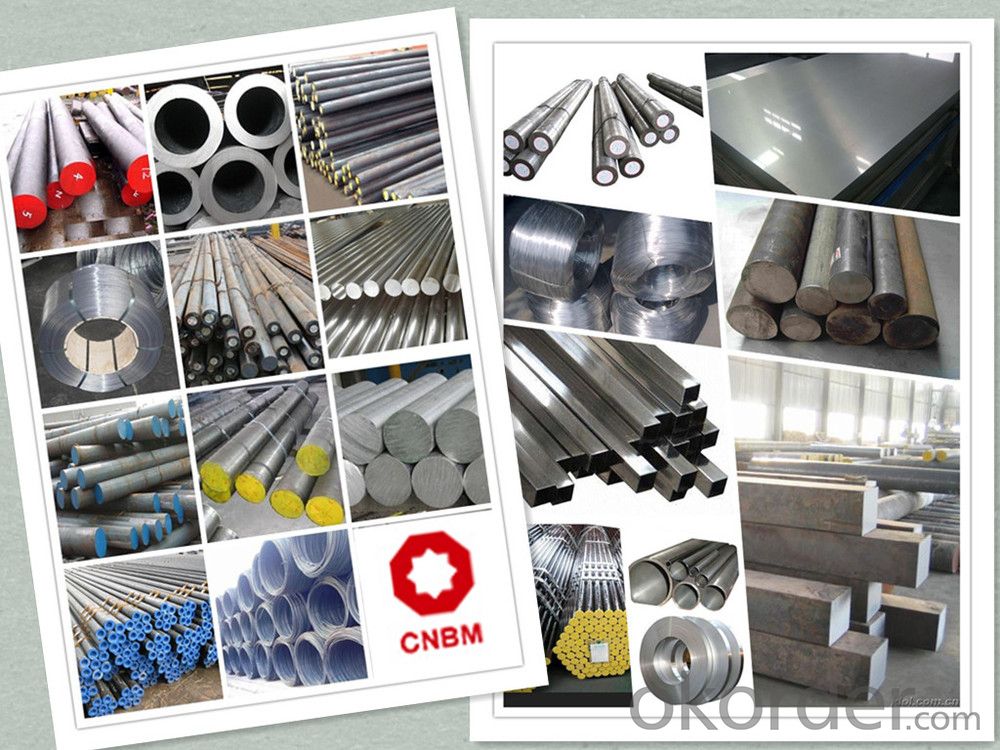
Product Overviews
| Product Name | Typical Grades | Diameter(mm) | Standard adopted |
| Carbon Steel | 20 (1020/S20C/C22) | Ø16-Ø300 |
GB/SAE/JIS/DIN
|
| 40 (1040/S40C/C40) | |||
| 45 (1045/S45C/C45) | |||
| Bearing Steel | GCr9 (51100/SUJ1) | Ø12-Ø250 | |
| GCr15 (52100/SUJ2/100Gr6) | |||
| GCr9SiMn (A485-Gr.1/SUJ3) | |||
Cr-Mo Steel | 20Cr (5120/SCr420H/20Cr4) | Ø12-Ø250 | |
| 40Cr (5140/SCr440/41Cr4) | |||
| 42CrMo(4140/SCM440/42CrMo4) | |||
| Gear Steel | 20CrNiMo | Ø16-Ø600 | |
| 20CrMn(5115/SMnC420/20MnCr5) | |||
| 20CrNiMo(8620/SNCM220/20CrMiMo2) |
Application
| Carbon Steel | Mold bottom, Plastic mold, Construction machinery parts Automobile parts, Security grills, Screens, Construction |
| Bearing Steel | Aerospace, Navigation, Nuclear energy, Chemical industry Electronic information, Petrochemical, Instrument and meter Transportation |
| Cr-Mo Steel | Mechanism & Fasteners gear, Stressed components for vehicles Engines and machines, Parts of larger cross-section |
| Gear Steel | All kinds of gears, Statically and dynamically stressed component for vehicles Engines and machine, Larger cross-section parts, Crankshafts |
Work Shop
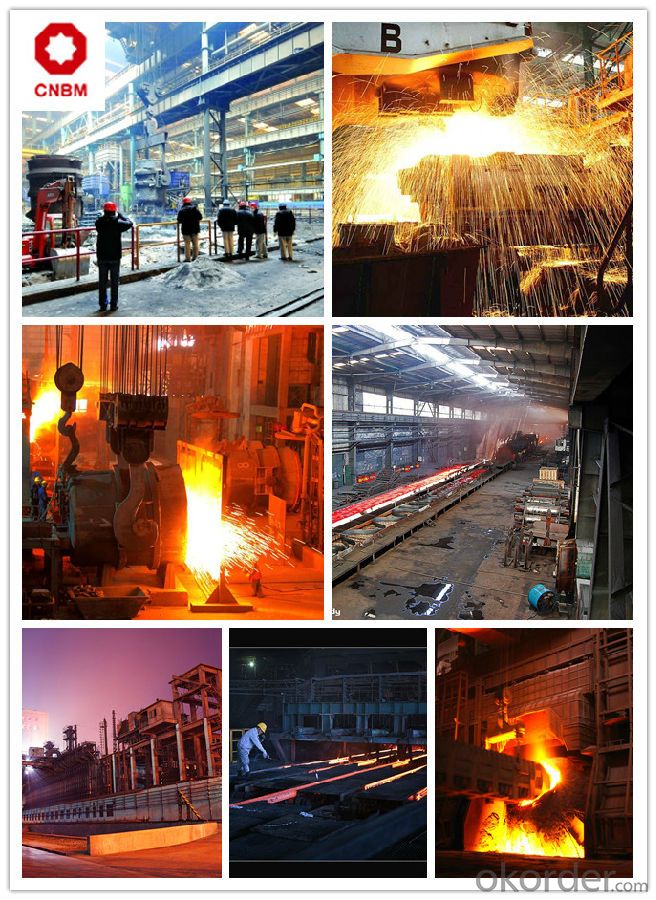
Company Information
CNBM International Corporation is the most important trading platform of CNBM group.
Whith its advantages, CNBM International are mainly concentrate on Cement, Glass, Iron and Steel, Ceramics industries and devotes herself for supplying high qulity series of refractories as well as technical consultancies and logistics solutions.

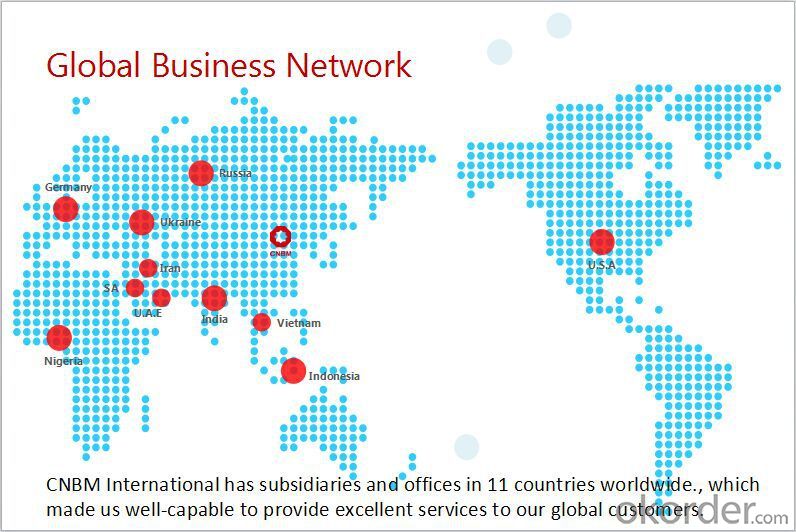
FAQ
1, Your advantages?
professional products inquiry, products knowledge train (for agents), smooth goods delivery, excellent customer solution proposale
2, Test & Certificate?
SGS test is available, customer inspection before shipping is welcome, third party inspection is no problem
3, Factory or Trading Company?
CNBM is a trading company but we have so many protocol factories and CNBM works as a trading department of these factories. Also CNBM is the holding company of many factories.
4, Payment Terms?
30% TT as deposit and 70% before delivery.
Irrevocable L/C at sight.
5, Trading Terms?
EXW, FOB, CIF, FFR, CNF
6, After-sale Service?
CNBM provides the services and support you need for every step of our cooperation. We're the business partner you can trust.
For any problem, please kindly contact us at any your convenient time.
We'll reply you in our first priority within 24 hours.
Packaging & Delivery
1, Packaging: seaworthy package or as required
2, Delivery: 35-45 days or based on quantity
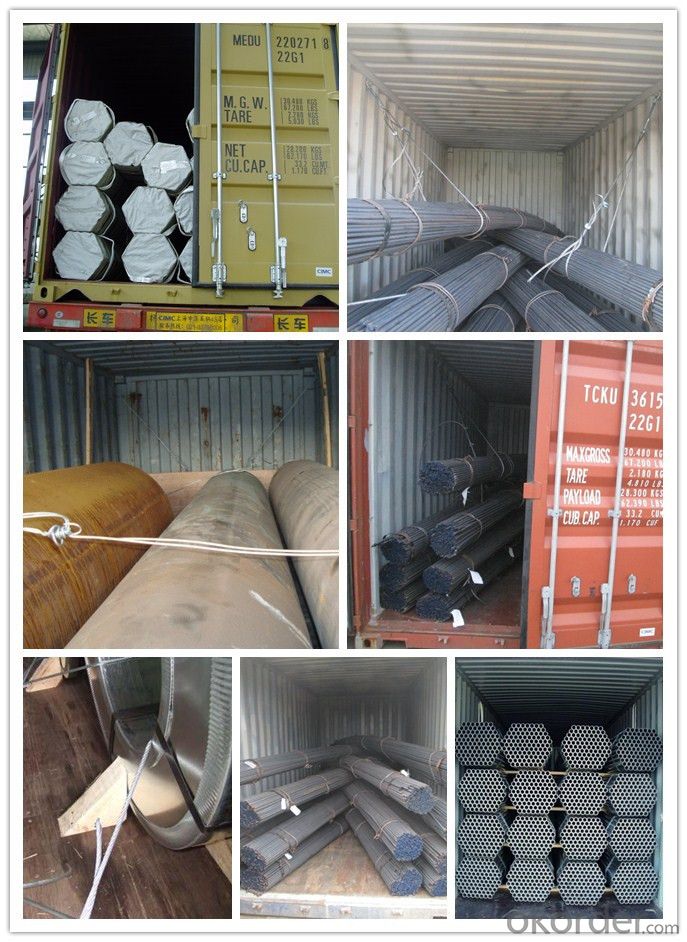
- Q: Are steel round bars prone to fatigue failure?
- Yes, steel round bars are generally prone to fatigue failure due to cyclic loading and repeated stress, especially when exposed to high loads or stress concentrations. However, factors such as material quality, design, and proper maintenance can help mitigate the risk of fatigue failure.
- Q: Can steel round bars be used for making steering linkages?
- Yes, steel round bars can be used for making steering linkages. Steel round bars are commonly used in various applications, including automotive and mechanical engineering, due to their high strength, durability, and resistance to wear and tear. Steering linkages are critical components in a vehicle's steering system, responsible for transmitting steering input from the steering wheel to the wheels. The use of steel round bars provides the necessary strength and rigidity required to ensure efficient and reliable steering performance. However, it is important to consider other factors such as the specific design requirements, weight considerations, and the desired level of flexibility or torsional properties when selecting the appropriate type and size of steel round bar for steering linkages.
- Q: Can steel round bars be used in the hospitality industry?
- Certainly! Steel round bars are indeed applicable in the hospitality field. Possessing versatility and durability, they are well-suited for a variety of purposes within this industry. These bars can be employed in the construction of furniture items like chairs, tables, and bar stools, as well as in the creation of decorative elements such as railings, light fixtures, and signage. Moreover, steel round bars offer exceptional strength and stability, thus ensuring the safety of both guests and staff members. Furthermore, they can be easily customized to align with the preferred aesthetic and design choices of different hospitality establishments. All in all, steel round bars prove to be a dependable and pragmatic option for the hospitality industry, thanks to their robustness, versatility, and visual appeal.
- Q: What are the advantages of using sulfur-alloy steel round bars?
- There are several advantages of using sulfur-alloy steel round bars. Firstly, sulfur-alloy steel round bars offer improved machinability, making it easier to shape and cut the material into desired forms. Additionally, the sulfur content in the alloy enhances the overall strength and hardness of the steel, making it more durable and resistant to wear and tear. Moreover, sulfur-alloy steel round bars have excellent thermal conductivity, allowing for efficient heat transfer during various applications. Lastly, these bars are cost-effective as they offer a combination of desirable properties at a relatively lower price compared to other specialized alloys.
- Q: How do you prevent warping during welding of steel round bars?
- To prevent warping during welding of steel round bars, several measures can be taken. Firstly, it is crucial to ensure proper fit-up and alignment of the bars before welding, as any misalignment can lead to distortion. Secondly, using an appropriate welding technique, such as back-stepping or stitch welding, can help distribute heat evenly and minimize warping. Additionally, controlling the heat input and avoiding excessive heat buildup by using intermittent welding or preheating can also prevent distortion. Lastly, the use of clamps, fixtures, or tack welds to secure the bars in place during welding can provide stability and reduce the chances of warping.
- Q: Can steel round bars be used in the automotive manufacturing?
- Yes, steel round bars can be used in automotive manufacturing. Steel round bars offer high strength and durability, making them suitable for various automotive components such as crankshafts, camshafts, axles, and suspension parts. They also provide excellent machinability and can be easily fabricated into the required shapes and sizes, making them a preferred choice in the automotive industry.
- Q: What are the advantages of using aluminum-silicon alloy steel round bars?
- There are several advantages of using aluminum-silicon alloy steel round bars: 1. Lightweight: Aluminum is a lightweight material, and when alloyed with silicon, it further enhances the strength-to-weight ratio, making the round bars lighter and easier to handle. This is particularly beneficial in applications where weight reduction is crucial, such as aerospace and automotive industries. 2. High strength: Aluminum-silicon alloy steel round bars possess excellent mechanical properties, including high tensile strength and good yield strength. This allows them to withstand heavy loads and provide structural integrity in various applications. 3. Corrosion resistance: Aluminum-silicon alloy steel round bars offer good corrosion resistance, especially in environments where moisture or chemicals are present. This makes them suitable for applications where exposure to harsh conditions or corrosive substances is a concern. 4. Thermal conductivity: Aluminum-silicon alloy steel round bars have excellent thermal conductivity, which allows for efficient heat transfer. This property is particularly advantageous in industries such as heat exchangers, where effective thermal management is essential. 5. Machinability: Aluminum-silicon alloy steel round bars are relatively easy to machine, allowing for precise shaping and forming. This makes them ideal for applications where intricate designs or specific dimensions are required. 6. Cost-effectiveness: Compared to other materials, aluminum-silicon alloy steel round bars offer a cost-effective solution due to their relatively low production and maintenance costs. This makes them a popular choice in various industries, including construction, automotive, and manufacturing. 7. Recyclability: Aluminum-silicon alloy steel round bars are highly recyclable, which is crucial in today's environmentally conscious world. Recycling aluminum-silicon alloys requires significantly less energy compared to primary production, making them a sustainable choice. Overall, the advantages of using aluminum-silicon alloy steel round bars include their lightweight nature, high strength, corrosion resistance, thermal conductivity, machinability, cost-effectiveness, and recyclability. These properties make them a versatile material for a wide range of applications across different industries.
- Q: What is the difference between a rough turned and a seamless steel round bar?
- A rough turned steel round bar is a metal bar that has undergone a preliminary turning process to achieve a rougher surface finish. This process removes excess material and helps create a more uniform diameter by eliminating surface imperfections or irregularities. Rough turned bars are commonly used in applications where a smooth surface finish is not necessary, such as in the manufacturing of machinery or agricultural equipment. On the other hand, a seamless steel round bar is a solid metal bar that is formed without any welding or seams. It is manufactured through a process called piercing, where a solid billet is heated and pierced with a mandrel to create a hollow tube. The tube is then elongated and reduced in diameter through rolling and drawing processes until it reaches the desired dimensions. Seamless round bars are known for their superior strength and resistance to corrosion, making them suitable for applications that require high performance, such as in the oil and gas industry or automotive manufacturing. To summarize, the main distinction between a rough turned and a seamless steel round bar lies in their manufacturing processes and surface finishes. Rough turned bars are created by removing excess material to achieve a rougher surface finish, while seamless bars are formed without any welding or seams, resulting in a smooth and continuous surface.
- Q: How do you calculate the weight of a steel round bar based on its density and dimensions?
- To calculate the weight of a steel round bar, you need to multiply its density by its volume. The volume of a round bar can be calculated using the formula V = πr^2h, where r is the radius and h is the height. Once you have the volume, simply multiply it by the density of the steel to get the weight.
- Q: What are the advantages of using spring steel round bars?
- Spring steel round bars have numerous advantages: 1. Exceptional strength: Known for their high strength, these round bars can withstand extreme stress and strain. They are perfect for applications that require durable and strong materials. 2. Remarkable flexibility: These round bars are incredibly flexible and can be easily shaped, bent, or formed without losing their strength. This quality makes them suitable for a wide range of manufacturing processes. 3. Superior elasticity: With excellent elasticity, these round bars can return to their original shape after being deformed or stressed. This elasticity is crucial for applications that require shock or vibration absorption. 4. Fatigue resistance: These round bars are highly resistant to fatigue and can endure repeated cycles of loading and unloading without losing their mechanical properties. This reliability and longevity make them ideal for demanding applications. 5. Exceptional toughness: Spring steel round bars exhibit outstanding toughness, enabling them to withstand sudden impacts or heavy loads without breaking or fracturing. They are perfect for harsh environments or heavy-duty operations. 6. Corrosion resistance: Many spring steel round bars are made from corrosion-resistant alloys, protecting them against rust and other forms of corrosion. They are ideal for applications where moisture or corrosive substances are present. 7. Cost-effective: Compared to other types of steel or materials, spring steel round bars offer a cost-effective solution. Their durability and longevity reduce the need for frequent replacements, resulting in long-term cost savings. In conclusion, spring steel round bars have numerous advantages, including high strength, flexibility, superior elasticity, resistance to fatigue, exceptional toughness, corrosion resistance, and cost-effectiveness. These properties make them a preferred choice in various industries such as automotive, construction, manufacturing, and aerospace.
Send your message to us
C40 Carbon Steel Round Bars
- Loading Port:
- China main port
- Payment Terms:
- TT OR LC
- Min Order Qty:
- 30 m.t.
- Supply Capability:
- 10000 m.t./month
OKorder Service Pledge
OKorder Financial Service
Similar products
Hot products
Hot Searches
Related keywords
